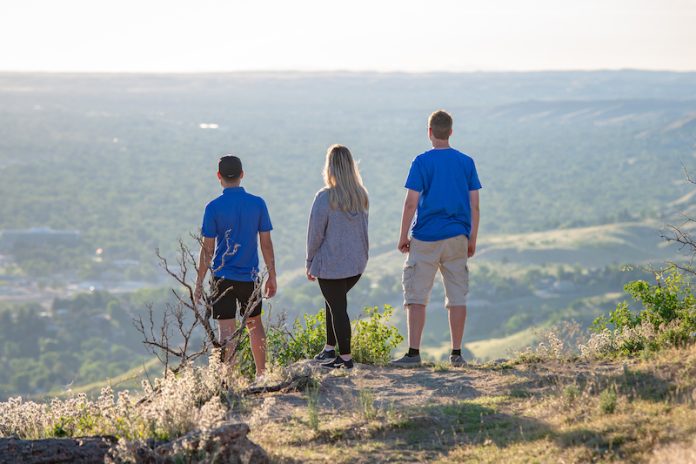By Alicia Griffith, Community Partnership Manager
In 2020, university president Marlene Tromp announced the launch of the Community Impact Program (CIP), which aims to increase educational attainment rates in rural and/or geographically isolated regions of the state, support local employer and workforce needs, and establish Boise State as an essential part of each community. The first three hub communities to participate in the program are the West Central Mountains, Mountain Home and the Western Treasure Valley.
Students are changing the course of their future
The Community Impact Program (CIP) is giving students the skills to change the trajectory of their future as well as make a lasting legacy in their communities.
Sarah Housbrouck, a McCall CIP student, said the program’s greatest benefit came from working closely with those who understand Idaho communities. “I really appreciated the ability in a rural setting to be able to earn college credits and make an impact within my community,” said Housbrouck. “Doing things with people from this area who understand nuances, political and cultural aspects that someone from a more urban setting may not acknowledge or fully grasp.”
Other students, like Aleah Nelson from Payette, enjoyed how the program provided a robust experience. “I liked CIP right from the start; CIP gives you a whole new energy and a new perspective,” said Nelson. “It is so impactful as a student, as a leader, in your job and your family. I feel like it ties all of my world together.”
Connecting students to Boise State and one another
Bringing CIP to local communities helps students create meaningful connections with the university. The intentional design of the program ensures that students build relationships with their instructors and fellow students. “CIP created a new atmosphere and connection as a student, not just to our cohort but helping me feel like a Boise State student – not just this ‘ online somewhere,’” said Nelson.
Boise State leadership, faculty, academic advisors, staff and community leaders collaborate to support program students and help them feel connected to the university.
“It’s really cool that CIP reached out to the communities out here like Parma, Payette, Fruitland and the rest of this area,” said Payette student Noe Gonzalez. “They are including us and making us feel like we are a part of Boise State. Especially being an online student, it really made me feel like I am a student at Boise State.”
For others, it’s not the connection with the university that makes the difference — it’s the connections made with fellow students.
“The piece that ultimately sold me on the program is that it is a cohort of people from your community,” said Housbrouck.
The combination of university connections and relationships built within cohorts aims to give students the skills to be well-connected, innovative leaders within their communities.
Student support driving an impact
The unique atmosphere created by CIP is built on the foundation of student support. CIP faculty and staff take pride in watching students accomplish their goals while impacting their community.
Before entering the program, students receive personalized assistance throughout the admission and enrollment process to ensure a stress-free experience.
“The faculty’s support is super important to me,” said Meghan Rickelman, a CIP student from Mountain Home. “It’s nice to know that they’re invested in my success.”
Beyond faculty and classroom support, CIP students have access to program staff to help navigate financial barriers and access other resources to aid student success. CIP staff also expedite resolutions to any real-time student issues within the university to help students receive the support they need while balancing their life and coursework.
“The enhanced and specialized support from staff and faculty allows students to concentrate on what is most important – life responsibilities,” said Alicia Griffith, the CIP community partnership manager at Boise State. “Students discontinue their education due to financial, time management, or course content difficulties. This program and its faculty and staff support are designed around alleviating those pressure points. This allows for a healthy life balance during the student’s education.”
Beyond alleviating pressure points and providing resources, Griffith shared how powerful it is for CIP faculty and staff to see already the impact students are making:
“Watching the relationships that our students are building with each other and community leaders is extremely exciting. They all care about identifying issues within their community and working together to find solutions to those issues,” said Griffith. “They put community first, and that community organizing is a powerful thing, as far as improving local quality of life.”
By building the CIP program around local communities, students receive support from one another, their community, and Boise State, giving them the tools they need to achieve their goals and help their community thrive.
Learn more about CIP
For more information about the Community Impact Programs and to join our team of community members supporting this effort: https://www.boisestate.edu/ruraleducation/

























